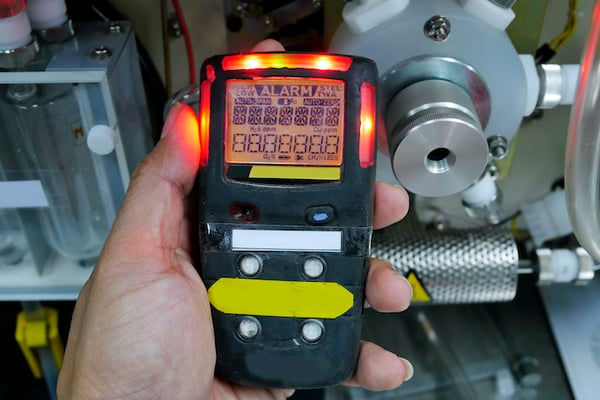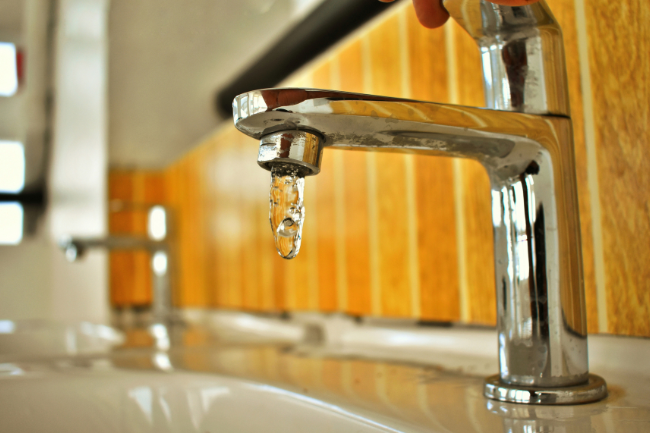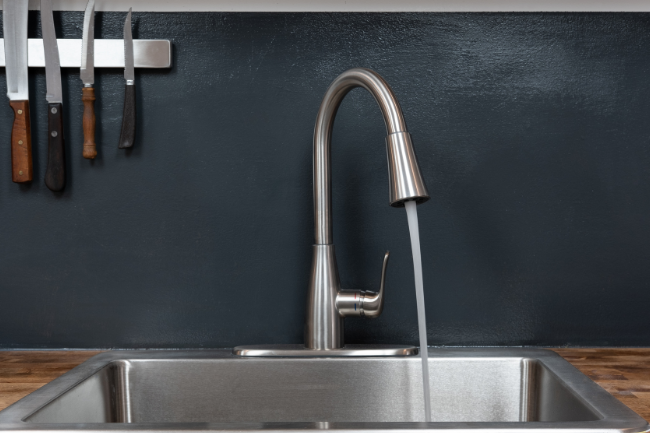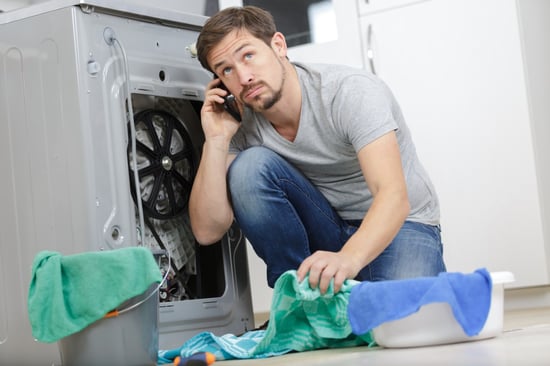5 Ways to Detect a Gas Leak In Your Home (+3 Best Detectors and Sensors)
Posted by Express Sewer & Drain Team on

Natural gas is a convenient source of energy that over 50 percent of homes in the United States rely on to dry clothing, cook food, heat water, and heat their homes. It is usually safe, but under certain circumstances, such as improperly installed or poorly maintained gas lines, gas leaks can turn into major problems for your health and your home.
Knowing how to detect gas leaks and how to repair simple gas leaks helps to keep the dangers caused by gas at bay. Learn about natural gas and its dangers, the signs of a gas leak, and how to prevent and fix leaks.
What is a Natural Gas Leak?
Natural gas is a fossil energy source that comes from under the Earth's surface. It is made up of methane, as well as non-hydrocarbon gases and other natural gas liquids. A natural gas leak occurs when a gas line or gas appliance springs a leak. The natural gas in the pipeline seeps out and leaks into open areas. Natural gas leaks are more likely to happen with old gas lines that are exposed begin to corrode. The outer material of the pipe wears away over time until small hairline fractures occur.
The Dangers of a Gas Leak
The methane present in natural gas can cause a host of problems. And although natural gas is non-toxic, in certain conditions, natural gas leaks can result in:
- Dizziness or asphyxiation when high concentrations of natural gases gather in confined spaces.
- Flammable mixtures that can explode when exposed to open air.
- Dead vegetation, trees, and houseplants.
- Higher gas bills.
- Costly property damages.
In other words, you need to know the basics of checking for gas leaks in your home.
How to Detect a Gas Leak
Here are five ways you can check for gas leaks in your house:
1. Check for a Sulfur or Rotten Egg Smell
Because most gases are colorless and odorless, natural gas companies usually put an additive called mercaptan into natural gas to give it a distinct smell. The odor often smells like sulfur or rotten eggs that can easily be detected in your home. If you smell this particular odor, it may be best to investigate the source of the leak or to contact a plumber.
2. Listen for a Whistling or Hissing Noise
If you're hearing a hissing or whistling noise sound near your gas line, then you might be experiencing a substantial gas leak. Pay attention to where the noise is coming from, because if you hear the hissing sound is occurring near your A/C, then it could be your refrigerant line, a leaking valve, or a damaged compressor.
3. Check the Stove or Range Top
Gas stoves typically give off a blue flame when you first turn on the burner. If your stove burner gives off orange or red flames, it means there may be gas in the air that's taking away oxygen.
4. Use a Gas Leak Detector
The most efficient way to find out if you have a gas leak is to use a gas leak detector. There are several gas leak detector options for you to choose from. Check out our recommendations in the last section of this post.
5. Conduct a Soapy Water Test
Mix a teaspoon of soap into a cup of water to get a concentrated solution. Douse the area you suspect is leaking with the soap and water solution, and look for bubbles to show up. This indicates that there is gas escaping from that area.
How to Prevent Gas Leaks In Your House
The best way to prevent gas leaks in your home is to make sure you are performing routine maintenance on all the equipment that uses gas, such as stoves, fireplaces, and furnaces. Every once in a while, check for signs of corrosion, breakage, warping, and damage on your gas lines. This helps to limit the chances that you'll experience a gas leak since you'll be able to make repairs before a full gas leak occurs.
Another option you can spring for to prevent gas leaks in your house is to have your home's gas system inspected. Professional plumbers give you an expert understanding of the gas system in your home, and they provide you with recommendations for any repairs or installations you may need.
The Best Gas Leak Detectors and Sensors
There are numerous has leak detectors and sensors on the market. When shopping around, it's best to purchase a device that can identify more than one gas. Detector and sensor manufacturers are very specific about which gas or gases their product can sniff out, so if it's not listed on the package, it's not going to sense it. Here are the most common types of gases the best gas leak detectors will warn you about.
- Combustible gases. Natural gas mostly comprises methane and propane. Combustible detectors use catalytic and infrared sensors, and because propane gas is heavier than air, you'll want to place detectors low to the ground.
- Toxic gases. Carbon monoxide from a leaking appliance or a vehicle running in an attached garage is harmful and even fatal. These gases are lighter than air, so place detectors high in the room.
- Radon: A high concentration of radon in your basement or crawl space isn't going to cause your home to explode like propane or natural gas can, however, it is radioactive. This makes it the second leading cause of lung cancer, so you definitely don't want it in the air.
Review the following gas leak detector and sensor choices that you can use in your home to help you and your family stay safe.
1. Propane and Natural Gas Detectors
Propane and natural gas detectors have portable, extension, or plug-in options. The Techamor Y301 is a methane, propane, and combustible natural gas leak detector that has a voice alarm and a digital display. It detects gas leaks in your home for 24 hours a day from your kitchen.
If you need to locate the exact source of a gas leak, it's best to go with a portable gas detector like the Y201 Portable Propane and Natural Gas Leak Detector. With this device, you can trace gas leaks indoors or outdoors.
2. Carbon Monoxide Alarm
Carbon monoxide is a gas that comes from household appliances that use gas, including boilers, central heating systems, water heaters, and cookers. Carbon monoxide is formed when fuels like natural gas, coal, or propane experience incomplete combustion.
Using a carbon monoxide detector can prevent serious injury and death when there are high concentrations in enclosed spaces. The First Alert Voice Location Smoke and Carbon Monoxide Alarm features an electrochemical CO sensor and voice alarm that provides you with a clear indication of where the carbon monoxide is the most concentrated.
3. Carbon Monoxide and Explosive Gas Detector
The best option to detect harmful gas leaks is a hybrid alarm that detects both carbon monoxide and other explosive gases, such as methane, propane, and other natural gases.
The First Alert Combination Explosive Gas and Carbon Monoxide Alarm can be plugged into any AC outlet. It also has a backup battery in case of a power outage. This alarm uses the most accurate tech available to sense high levels of gases in your home. The Kidde Nighthawk Carbon Monoxide & Propane, Natural, & Explosive Gas Detector also comes highly recommended.
4. Radon Detector
The Environmental Protection Agency (EPA) recommends homes be fixed if the radon level is 4 pCi/L (picocuries per liter) or more. Because there is no known safe level of exposure to radon, it also recommends fixing the problem for radon levels between 2 pCi/L and 4 pCi/L (it is difficult to reduce levels below 2 pCi/L).
The Airthings Corentium Home Radon Detector 223 is a lightweight, portable radon detector that is battery operated. Because radon levels fluctuate daily, on-screen results show both long-term readings. If levels are high and you take steps to correct the problem, its short-term readings will then show if the fixes did the trick.
How to Fix Gas Leaks In Your Home
Once you detect a leak, it's best to fix the leak as soon as possible. Check out some of our tips for fixing a gas leak in your house. Here are seven steps you need to follow to help you fix your gas leak fast.
1. Turn Off the Gas and Remove Outer Covers
Working with gas is highly dangerous. Make sure the gas is turned completely off before you begin your safe repair process.
After you turn off the gas, remove the gas line covers to expose the gas pipes. Make sure you put on a mask to avoid inhaling gases, and protect your hands as well by using gloves.
2. Detach the Gas Line
Gas line leaks often occur because of high pressure inside the pipe. Repairing the leak requires you to remove the gas line from the gas regulator.
3. Remove the Residue Gas Pressure and Clean the Line
Your gas lines will most likely contain gas residue. Remove the gas residue to relieve the pipe. You'll be required to crack the line fittings that you see on the high-pressure line. Use a wrench to carry out this task.
Then, use acetone to clean the high-pressure line. The goal is to remove impurities that could lead to another gas leak.
4. Attach the Gas Line
Make sure the gas line fits loosely when you attach it so you can avoid causing new leak points. Apply rubber tape to hold the grip firmly in place to ensure the leak is sealed well.
Check the angle of the gas lines to ensure they're right so the high-pressure line doesn't disrupt the low-pressure line.
5. Apply Epoxy
Place epoxy on the gas line by following the directions written on the package. Leave the epoxy to dry overnight.
Once this is complete, it is time to tighten the high-pressure gas line's fittings. Then, install the low-pressure gas line.
6. Test the Gas Lines
Don't assume the gas line repair process was successful and go about your regular routine. Test the gas lines first.
Turn on the gas, and check for leaks using a detector or your preferred detection method. Repeat the gas leak sealing process until you are sure there are no more gas leaks.
Place the covers back on your gas pipes after you've repaired the gas leaks.
7. Call a Plumber
If you can't find the true source of your gas leak or you believe the gas leak is more serious than you originally thought, make sure to call a professional plumber to repair your gas pipes. This way, you can ensure your problem is being taken care of, and you can rest easy at night knowing there aren't any harmful gases seeping into your home.
It's especially important to contact a plumber to fix any gas leaks caused by an earthquake or some other natural disaster.
Knowing how to detect a gas leak is essential to the health of your family, and it aids you in preventing a disaster. In the event you suspect a gas leak in your home, hiring plumbers who are well-versed in fixing complex gas pipe issues is a good idea.
Topics: Pipe Leaks and Repair, Home Plumbing







